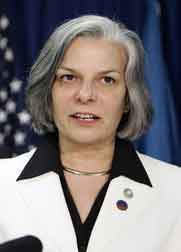CDC chief: ‘This should never happen’
A Las Vegas endoscopy clinic's reuse of syringes and vials might represent the "tip of the iceberg" of unsafe practices in ambulatory care centers nationwide, the Centers for Disease Control and Prevention's top official said on Monday.
"This should never happen in a contemporary health care organization,'' Dr. Julie Gerberding said during a media conference call with Sen. Harry Reid, D-Nev., and state health officials about an investigation into the Endoscopy Center of Southern Nevada.
Nevada health officials are trying to contact 40,000 of the Shadow Lane clinic's patients to urge them to get tested for hepatitis and HIV. The mass notification began Wednesday, the result of a belief that six patients contracted hepatitis C at the facility because of unsafe practices including the reuse of syringes and vials.
"This is the largest number of patients that have ever been contacted for blood-borne exposure in a health-care setting,'' Gerberding said. "Unfortunately we have seen other large-scale situations where similar practices have led to patient exposures.''
Gerberding said health officials need to be much more aggressive about detecting improper practices in medical facilities so patients can be alerted and tested in a timely manner.
Reid, who initiated the conference call, agreed.
He said his office would work with Gerberding to get the CDC more resources in an emergency spending bill Congress is to take up in April.
"Dr. Gerberding has a lot of things on her plate,'' he said. "I plan to work with her office to see what we can do to help.''
Gerberding said health care accreditors would see this as a patient safety error that falls into the category of a 'never event.'
That means "this should never happen in contemporary health care organizations," she said.
A senior epidemiologist for the Southern Nevada Health District who also was on the conference call said he didn't know how many of the 40,000 patients seen at the clinic between March 2004 and Jan. 11 of this year would be contacted.
Brian Labus said the health district didn't have correct addresses for at least 1,400 people.
Labus could not determine how many of the 40,000 people might have contracted hepatitis C at the clinic or from some other source, because 4 percent of the population has the blood-borne disease.
"An individual test result cannot tell where the person was infected,'' Labus said.
State health officials also said they were looking into unsafe practices at other endoscopy centers in Nevada, but would not specify which ones.
"I think we're broadly looking at the medical community where anyone could be doing unsafe injection practices,'' Labus said.
Reid applauded efforts by the Southern Nevada Health District for making the connection between the six people infected with hepatitis C and the Endoscopy Center of Southern Nevada.
It was "like finding a needle in a haystack,'' Reid said.
Contact reporter Annette Wells at awells@reviewjournal.com or (702) 383-0283.


















